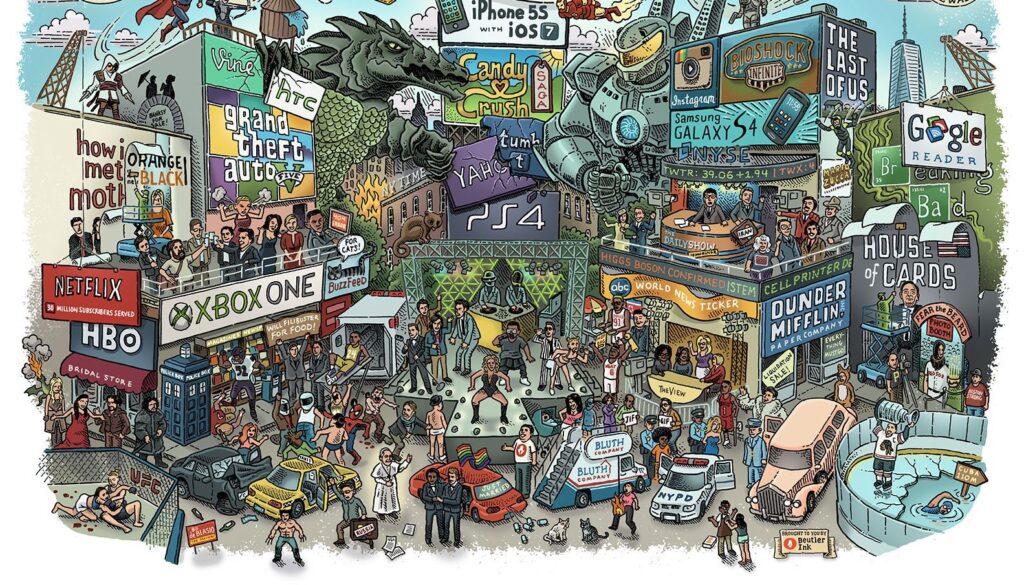By Katerina Dimarogkona,
Feeling uneasy and distressed, many fear culture globally is changing too fast and that the world’s ancient traditions cannot withstand the pressure of competition in the global market. Looking at what movies are played in cinemas, what music is danced and sung to, and what lifestyles people adopt, we see an alarming trend of increasing homogeneity across cultures. In most places in the world, pop culture is becoming an increasingly confusing mixture of traditional and mostly American elements. While these facts are common ground, resistance to the effects of globalization and foreign influence is often thought to be deeper fear of progress and irrationally backward-looking. I hope what is expressed here is perceived as genuine concern, and that the reasons for concern are not found to be groundless. And while I am not claiming that this complicated problem is fully explained here, some of the greatest causes are probably mentioned.
Our cultural environment is, in many ways, an entity that can be described as “alive”, or as a superorganism, if you will. A system comprised of a connection between living beings that has ways of renewing itself, of growing, and of decaying can be thought of in that way. A communal force, that shapes our common identity, spreading harmony in society. It unites people who are vastly different in other aspects, and forges a common identity across different generations, creating a common language between them. The traditional songs, dances, and traditions that have been changing and maturing slowly have created a link that has withstood several millennia.
When cultural change happens too fast, due to globalization, for example, the link might be broken, and the destruction that results might be irreparable. For when the youth cannot relate to the lifestyle of their forefathers and their own culture feels foreign to them, they lose access to the symbols and way of life, which has helped others before them to grow as people, as communities. They feel confused, without direction, and unable to express their life through art in the community that they belong; for in the global cultural community, one can consume content passively with much greater ease than they can contribute to it meaningfully by self-expression, this being even more true for those not fluent in English. The deeper historical, socio-political, and spiritual life of the person is not represented in a one-size-fits-all culture.

There are proponents of the idea that the exchange and the connection between cultures are desirable since anything really useful in our lives has usually been influenced by more than one tradition, place, or way of thinking. The example has been made that any spice making our food tastes better, any philosophical or technological idea, as well as simply any music, or even language, at some point in time has been influenced by other cultures or has come from somewhere else, so our lives would be incredibly bland if there had been no exchange. It is pointless, the argument goes, to try to go back to some point in history when the culture was, “pure”, not influenced by anyone, because it was simply not better then. I fully agree with that.
The problem I have with the rampant change we as people are going through is that it is all happening too fast, and the integration of cultural elements is not smooth at all. We are creating a single pool of information, where all can be influenced by all, all of the time. For there to even exist different cultures to influence each other, there has to exist variance in our ideas and influence. It is incredibly important that there exist numerous ways to live life, create, and think. That is why I believe some isolation between communities is necessary for their survival. Are we living in times, where the vast majority of our heritage is about to be erased, only to be replaced by something arguably inferior?
Forgotten in the midst of this confusion is that the creation of culture is an organic process, one that happens slowly. The wisdom of our ancestors, remaining relatively unchanged, is passed down to us, giving us a philosophy of life and an artistic language of symbols commonly understood and appreciated. It expresses our feelings and desires under an accepted set of values, uniting the community in the process. Old elements and ideas that are deemed irrelevant, unjust, or untrue are discarded, and new additions are made, so that the culture evolves over time, albeit not in a linear fashion.

While rigidly sticking to any and all tradition is rightfully frowned upon by our culture, we might be throwing the baby out with the bathwater, when, in changing so fast, we are in fact doing away with the wisdom of the ages, to make room for novelty that will not stand the test of time. The link between our communal identity and that of the past is broken, and we cannot see ourselves in our ancestors. Thus, the rapidity with which our civilization is changing is causing it to dwindle, and one can fear it may in some years, die completely.
The other factor leading to the destruction of traditional cultural bonds is the competition of all cultures, in this global sphere of influence that has been created. In such an environment, billion-dollar entertainment industries are created, rendering the local competition of artists with corporate giants all but futile. Mainstream economic thought tells us that competition between different corporations in countries will result in net benefits for all. When we exchange wine for potatoes or other such goods, all is well with that idea. What happens, though, when that is applied to “sacred” things, like culture, is that the power of competition and market efficiency destroys the living force that drives different cultures forward, making them hollow by destroying the cultural environment that created them.
A cultural crisis somewhat like the environmental one is what I believe this is, and maybe it might be helpful to think of it in those terms. This is one of those issues that people often take more and more seriously as they grow older, and I am grieved to say that my experience as a young person today does not leave me hopeful for the future. There is hope, however, that the importance of this issue will become more recognized and that it will be again seen that humanity’s greatest achievement is mostly cultural and spiritual, that inner life has value.
References
- Jacques Ellul, The Technological Society, translated by John Wilkinson, Vintage Books, 1964 (English translation)
- Culture and the Economy: Understanding the Dynamics of Globalization, hec.edu, Available here
- From Mechanics to Organics: An Interview with Elisabet Sahtouris, scott.london, Available here




